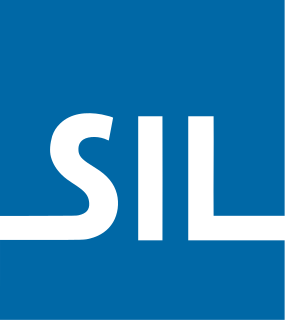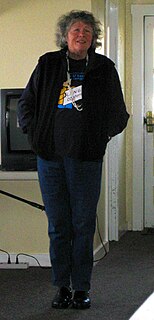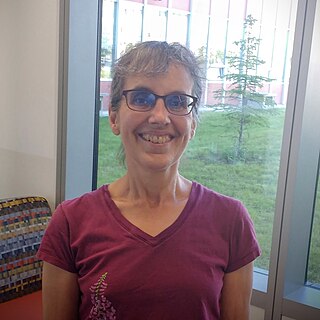Related Research Articles

SIL International is an evangelical Christian non-profit organization whose main purpose is to study, develop and document languages, especially those that are lesser-known, in order to expand linguistic knowledge, promote literacy, translate the Christian Bible into local languages, and aid minority language development.

Mary Rosamond Haas was an American linguist who specialized in North American Indian languages, Thai, and historical linguistics. She served as president of the Linguistic Society of America. She was elected a fellow of the American Academy of Arts and Sciences and a member of the National Academy of Sciences.

Kenneth Locke Hale, also known as Ken Hale, was an American linguist at the Massachusetts Institute of Technology who studied a huge variety of previously unstudied and often endangered languages—especially indigenous languages of North America and Australia. Languages investigated by Hale include Navajo, O'odham, Warlpiri, and Ulwa, among many others.

The Linguistic Society of America (LSA) is a learned society for the field of linguistics. Founded in New York City in 1924, the LSA works to promote the scientific study of language. The society publishes three scholarly journals: Language, the open access journal Semantics and Pragmatics, and the open access journal Phonological Data & Analysis. Its annual meetings, held every winter, foster discussion amongst its members through the presentation of peer-reviewed research, as well as conducting official business of the society. Since 1928, the LSA has offered training to linguists through courses held at its biennial Linguistic Institutes held in the summer. The LSA and its 3,600 members work to raise awareness of linguistic issues with the public and contribute to policy debates on issues including bilingual education and the preservation of endangered languages.
Lyle Richard Campbell is an American scholar and linguist known for his studies of indigenous American languages, especially those of Central America, and on historical linguistics in general. Campbell is professor emeritus of linguistics at the University of Hawaiʻi at Mānoa.
Robert Hale Ives Goddard III is a linguist and a curator emeritus in the Department of Anthropology of the National Museum of Natural History at the Smithsonian Institution. He is widely considered the leading expert on the Algonquian languages and the larger Algic language family.
Marianne Mithun is an American linguist specializing in American Indian languages and language typology. She is professor of linguistics at the University of California at Santa Barbara, where she has held an academic position since 1986. She served as the president of the Linguistic Society of America in 2020.

Leanne Hinton is an American linguist and emerita professor of linguistics at the University of California at Berkeley.
Judith Lillian Aissen is an American professor emerita in linguistics at the University of California, Santa Cruz.
Colleen M. Fitzgerald is an American linguist who specializes in phonology, as well as language documentation and revitalization, especially with Native American languages. She is the Vice President for Research and Creative Activity at North Dakota State University. Previously she was Associate Vice President for research at Texas A&M University–Corpus Christi., and Professor in the Department of Linguistics and TESOL the University of Texas at Arlington where she directed the Native American Languages Lab. She formerly served as chair of the department.
Claire Louise Bowern is a linguist who works with Australian Indigenous languages. She is currently a Professor of Linguistics at Yale University, and has a secondary appointment in the department of Anthropology at Yale.

Keren Rice is a Canadian linguist. She is a professor of linguistics and serves as the Director of the Centre for Aboriginal Initiatives at the University of Toronto.
Judith Tonhauser is a Professor of English Linguistics at the University of Stuttgart.
The Institute on Collaborative Language Research or CoLang is a biennial training institute in language documentation for any person interested in community-based, collaborative language work. CoLang has been described as part of a modern collaborative model in community-based methodologies of language revitalization and documentation.
Helen Aristar-Dry is an American linguist who currently serves as the series editor for SpringerBriefs in Linguistics. Most notably, from 1991 to 2013 she co-directed The LINGUIST List with Anthony Aristar. She has served as principal investigator or co-Principal Investigator on over $5,000,000 worth of research grants from the National Science Foundation and the National Endowment for the Humanities. She retired as Professor of English Language and Literature from Eastern Michigan University in 2013.
Andrea Berez-Kroeker is a documentary linguist and professor in the Dept. of Linguistics at the University of Hawai'i-Manoa. She is the director of the Kaipuleohone archive of endangered languages. She is an expert on the practices of reproducibility and management of data in the field of linguistics.
The Victoria A. Fromkin Lifetime Service Award is an award named after linguist Victoria Fromkin that is given to a member of the Linguistic Society of America who has performed "extraordinary service to the discipline and to the Society" throughout their career. First presented in 2001, the award is presented annually and was most recently presented to Sarah Thomason.
Kristine Hildebrandt is an American linguist who is known for her research into Tibeto-Burman languages and languages of the Himalayas. Her work focuses on the Nar-Phu and Gurung languages and other languages of the Manang District of Nepal, with an expertise in phonetics.
Patience Louise "Pattie" Epps is an American linguistics professor and researcher at the University of Texas at Austin whose main research focus is on the Naduhup language family, which consists of four extant languages in the Amazon.
Kristen Syrett is a linguist whose work focuses on language acquisition, psycholinguistics, semantics, and pragmatics.
References
- 1 2 "LSA Honors and Awards". LinguisticSociety.org. Retrieved 23 July 2019.
- ↑ Thomason, Sarah G. (2015). Endangered Languages: An Introduction, p.14. Cambridge University Press. ISBN 9781316298008. Cites: "The Need for the Documentation of Linguistic Diversity", policy statement, LinguisticSociety.org. Accessed: 23 July 2019.
- 1 2 3 4 5 6 7 8 9 10 "Kenneth L. Hale Award Previous Holders", LinguisticSociety.org. Accessed: 23 July 2019.
- ↑ "2019 Award Winners Announced: Early Career Award, Kenneth L. Hale Award, & Linguistics, Language, and the Public Award | Linguistic Society of America". www.linguisticsociety.org. Retrieved 2019-03-01.
- ↑ "2020 Award Winners Announced: Early Career Award, Kenneth L. Hale Award, & Linguistics, Language, and the Public Award | Linguistic Society of America". www.linguisticsociety.org. Retrieved 2021-03-08.